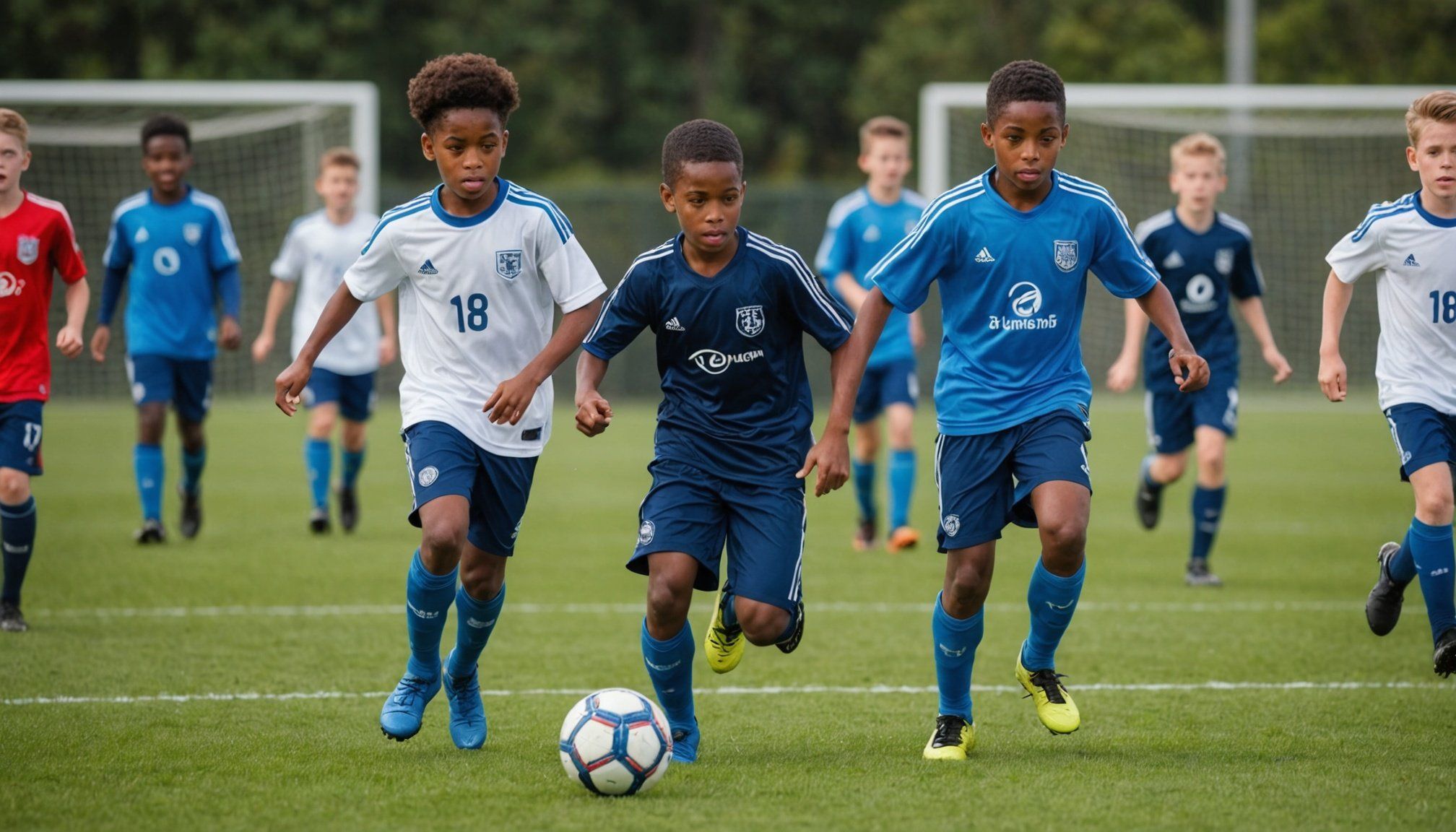Importance of Cognitive Skills in Youth Football
In youth football, cognitive skills are indispensable for honing a player’s performance. They are often pivotal in situations that demand quick decision-making and precise execution on the pitch. Cognitive skills such as spatial awareness, memory, and attention greatly influence how players anticipate opponents’ moves, maintain focus, and manage game strategies.
Training exercises specifically designed to enhance cognitive abilities have shown a profound impact on player development. When integrated into regular coaching sessions, these exercises improve decision-making processes, enabling players to assess situations and respond effectively in high-pressure environments. This results in more strategic play, where the players adeptly read the game, foresee plays, and adapt their tactics accordingly.
Have you seen this : Power up your game: unique drills to enhance left-footed kicking for right-dominant soccer stars
Furthermore, enhanced cognitive skills correlate directly with on-field success. Players with advanced cognitive training typically demonstrate superior technical performance and more cohesive teamwork. They possess the agility of thought that outmatches their physical counterparts, invariably leading to more successful outcomes in matches.
Incorporating cognitive training into football development programs not only equips players with the necessary mental skills but also fosters an environment where they can thrive and excel under competitive conditions.
Also to discover : Elevate team morale: proven techniques for football managers to inspire confidence in challenging moments
Cutting-edge Cognitive Training Techniques
In the modern era of football, cognitive training techniques are transforming how young players develop crucial game skills. These innovative football drills are now essential to the training regimens in academies worldwide.
Visual Perception Drills
To enhance spatial awareness, visual perception drills play a pivotal role. These exercises hone players’ ability to interpret the field, anticipating the flow of the game. For instance, drills focusing on peripheral vision help players monitor movements around them without losing sight of the ball. Improved visual training significantly boosts tactical awareness, allowing players to anticipate plays and execute strategic decisions swiftly.
Reaction Time Exercises
Speed of response can drastically impact a player’s performance, particularly in pressured situations. Various drills are designed to fine-tune this aspect, often incorporating cutting-edge technology to measure and enhance reaction times. By using tools like smart cones and response lights, players can train their quick-thinking abilities, ensuring sharper performance during crucial moments in a match.
Mental Simulation and Imagery Training
These cognitive training techniques involve mental rehearsal and visualization to deepen players’ skill acquisition. By visualizing game scenarios and mentally practicing plays, athletes prepare for varied match conditions. Such techniques have proven effective, with case studies illustrating the advantages of imagery training in equipping players for real-game challenges.
Integrating Technology in Cognitive Training
In the evolving realm of youth football, technology in football training is becoming indispensable. From innovative software to state-of-the-art apps, these tools significantly bolster cognitive skill enhancement. A variety of platforms are now available, designed with precision to develop players’ cognitive prowess as they engage in football academies worldwide. These tools are adept at creating intricate scenarios that mimic real match situations, thereby refining players’ anticipation and decision-making skills.
Virtual reality (VR) stands out as a revolutionary addition to the training environments. By simulating real-world football scenarios, VR enables players to experience and navigate complex game conditions without the physical strain of the pitch. This immersive experience sharpens cognitive training techniques by allowing athletes to practice strategic moves and responses in a controlled environment.
Additionally, data analytics play a pivotal role in monitoring cognitive progress. This method offers personalized insights by tracking players’ cognitive development over time. With precise analytics, coaches can tailor training sessions to refine each player’s techniques, ensuring a progressive improvement. Embracing technology not only modernizes training approaches but also paves the way for dynamic, data-driven player development.
Case Studies from Successful Football Academies
Examining real-world results, case studies in football training reveal the profound impact of cognitive skills programs. These successful initiatives illustrate how comprehensive strategies and innovations enhance a player’s development significantly.
Academy A: Holistic Approach to Cognitive Training
Academy A stands out with its holistic methodology. By implementing diverse cognitive drills, this institution ensures players develop essential skills in spatial awareness, memory, and attention. Training regimens often include a variety of exercises designed to mimic game scenarios, fostering strategic decision-making in players.
Testimonials from coaches and players consistently highlight the program’s effectiveness. Coaches observe notable advancements in young athletes’ performance, particularly their improved game anticipation and execution. Players themselves report feeling more confident and prepared on the field, attributing this to the academy’s unique blend of cognitive exercises.
Academy B: Use of Technology in Training
Academy B integrates cutting-edge technology in football training, using advanced tools to track and enhance player performance. Here, virtual reality and data analytics play significant roles. By simulating realistic match conditions, players practice strategic moves without physically strenuous activities, refining their cognitive skillset. Reviewing player performance metrics reveals improved reaction times and decision-making capabilities, leading to enhanced overall team dynamics. The academy remains committed to developing its successful cognitive skills programs further.
Implementation Strategies for Coaches and Trainers
Implementing cognitive training into youth football programs requires a strategic approach to maximise its benefits. For coaches and trainers aiming to foster cognitive skills in football, establishing a balanced training regimen that integrates cognitive drills alongside traditional physical exercises is crucial. This balance ensures young players develop both mental acuity and physical prowess simultaneously, preparing them holistically for matches.
To engage young players effectively in cognitive training, it is essential to incorporate coaching techniques that captivate and motivate. For example, using game-like scenarios and incorporating elements of competition can significantly enhance engagement and learning. Keeping the sessions interactive and enjoyable encourages players to invest fully in their cognitive development.
Evaluating and adjusting the effectiveness of these training programs is vital. Regular analysis of players’ progress, through observation and feedback, can inform necessary changes or enhancements in training. This might involve redefining youth football training drills to better suit individual and team needs.
By applying these implementation strategies thoughtfully, coaches and trainers can contribute significantly to the cognitive and overall development of young players, setting a strong foundation for both immediate and long-term success on the field.











